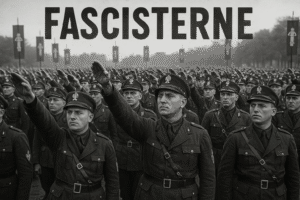
Introduction
The term fascisterne has drawn increasing interest in recent years, particularly in historical, political, and social discussions. Whether you’re a student, a researcher, or simply curious about the rise and fall of ideological movements, understanding what fascisterne stands for is essential in grasping modern socio-political dynamics. In this article, we’ll explore the origin, implications, and contemporary relevance of fascisterne in both historical and cultural contexts.
What Does Fascisterne Mean?
Fascisterne is the Danish plural for “fascists,” referring to individuals or groups who support or adhere to fascism. Originating from the Latin word fasces—a bundle of rods symbolizing unity and authority—fascism as a political ideology took root in early 20th-century Europe, most notably under Benito Mussolini in Italy and later Adolf Hitler in Germany.
The term fascisterne encapsulates not just a political leaning but a worldview shaped by:
-
Authoritarian governance
-
Suppression of dissent
-
Extreme nationalism
-
Anti-democratic values
Fascist movements are typically characterized by dictatorial power, forcible suppression of opposition, and strong regimentation of society and the economy.
Historical Background of Fascisterne
To understand fascisterne, it’s crucial to go back to the 1920s and 1930s, when Europe saw a wave of radical political movements that challenged liberal democracies. Fascism emerged as a reaction to perceived threats from communism, socialism, and liberalism. In Denmark, although a full-scale fascist regime never took hold, small fascist-inspired groups like the DNSAP (Danmarks Nationalsocialistiske Arbejderparti) sought to mimic the ideologies of Nazi Germany.
The role of fascisterne in Denmark was minor compared to countries like Germany and Italy. However, they left a noticeable imprint, particularly during World War II when the German occupation of Denmark brought local fascist sympathizers to the forefront. These individuals—often seen as traitors—attempted to align Danish governance with the Axis powers’ fascist agenda.
Modern-Day Perception of Fascisterne
In modern contexts, the term fascisterne is often used critically to label individuals or political factions perceived as authoritarian or anti-democratic. It’s not uncommon to see this label misused in online arguments or political rhetoric, making it vital to differentiate between genuine fascist ideology and hyperbolic accusations.
Contemporary use of the term might refer to:
-
Extremist political parties
-
Far-right movements
-
Nationalist groups
-
Anti-immigrant sentiments
The continued interest in fascisterne is also due to increased polarization in global politics. As societies grapple with issues like economic inequality, migration, and national identity, extremist ideologies—sometimes rooted in fascist thought—are resurfacing in both digital spaces and public discourse.
Cultural and Commercial Reinterpretation of Fascisterne
Interestingly, the term fascisterne is now being reimagined and discussed not only in political debates but also in cultural and commercial spheres. Designers, artists, and even fashion entrepreneurs have begun exploring the provocative aesthetics and historical themes tied to the concept.
One such example is visible at Jewels Galaxy Wholesale, where the term fascisterne takes on a new life in curated artistic expression and unique branding. This transformation shows how powerful and controversial terms can evolve with shifting cultural interpretations.
While the term still holds strong political and historical weight, its adaptation into artistic or branding narratives indicates how society continues to wrestle with, reinterpret, and sometimes commodify such potent symbols.
Why Fascisterne Still Matters Today
Studying fascisterne isn’t just about looking back; it’s about staying vigilant today. The resurgence of authoritarian leaders, censorship, and political extremism across the world makes it imperative for people to understand the historical mistakes of the past.
Here are a few reasons why awareness of fascisterne remains relevant:
-
Educational Value: Understanding the rise of fascism helps societies safeguard democratic principles and human rights.
-
Warning Sign: When civil liberties begin to erode, recognizing early signs similar to those seen in fascist regimes becomes crucial.
-
Preventing Repetition: Remembering the atrocities and failures of fascist governance can deter modern societies from repeating the same mistakes.
Conclusion
Fascisterne is more than a historical label—it’s a reminder of the dangers that authoritarianism and intolerance pose to democratic societies. As the world becomes more interconnected yet politically fragmented, the lessons from fascisterne must remain part of our global consciousness.
Whether used in educational contexts or reimagined in commercial projects like this curated page, the term carries layers of meaning worth exploring.
Stay informed. Stay critical. And most importantly, learn from the past.